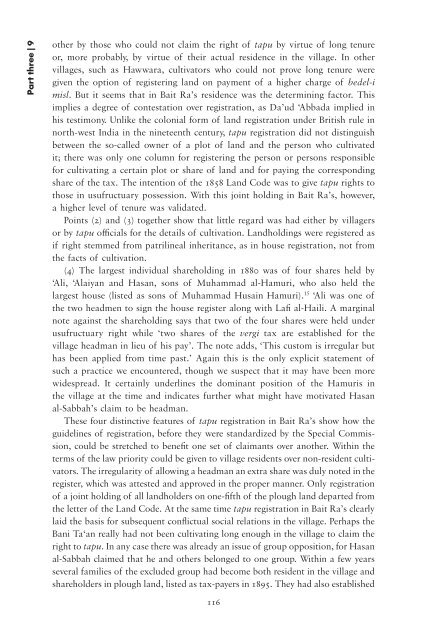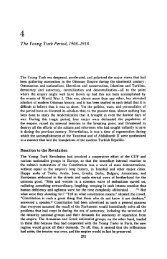Governing property, making the modern state - PSI424
Governing property, making the modern state - PSI424
Governing property, making the modern state - PSI424
You also want an ePaper? Increase the reach of your titles
YUMPU automatically turns print PDFs into web optimized ePapers that Google loves.
Part three | 9<br />
o<strong>the</strong>r by those who could not claim <strong>the</strong> right of tapu by virtue of long tenure<br />
or, more probably, by virtue of <strong>the</strong>ir actual residence in <strong>the</strong> village. In o<strong>the</strong>r<br />
villages, such as Hawwara, cultivators who could not prove long tenure were<br />
given <strong>the</strong> option of registering land on payment of a higher charge of bedel-i<br />
misl. But it seems that in Bait Ra’s residence was <strong>the</strong> determining factor. This<br />
implies a degree of contestation over registration, as Da’ud ‘Abbada implied in<br />
his testimony. Unlike <strong>the</strong> colonial form of land registration under British rule in<br />
north-west India in <strong>the</strong> nineteenth century, tapu registration did not distinguish<br />
between <strong>the</strong> so-called owner of a plot of land and <strong>the</strong> person who cultivated<br />
it; <strong>the</strong>re was only one column for registering <strong>the</strong> person or persons responsible<br />
for cultivating a certain plot or share of land and for paying <strong>the</strong> corresponding<br />
share of <strong>the</strong> tax. The intention of <strong>the</strong> 1858 Land Code was to give tapu rights to<br />
those in usufructuary possession. With this joint holding in Bait Ra’s, however,<br />
a higher level of tenure was validated.<br />
Points (2) and (3) toge<strong>the</strong>r show that little regard was had ei<strong>the</strong>r by villagers<br />
or by tapu officials for <strong>the</strong> details of cultivation. Landholdings were registered as<br />
if right stemmed from patrilineal inheritance, as in house registration, not from<br />
<strong>the</strong> facts of cultivation.<br />
(4) The largest individual shareholding in 1880 was of four shares held by<br />
‘Ali, ‘Alaiyan and Hasan, sons of Muhammad al-Hamuri, who also held <strong>the</strong><br />
largest house (listed as sons of Muhammad Husain Hamuri). 15 ‘Ali was one of<br />
<strong>the</strong> two headmen to sign <strong>the</strong> house register along with Lafi al-Haili. A marginal<br />
note against <strong>the</strong> shareholding says that two of <strong>the</strong> four shares were held under<br />
usufructuary right while ‘two shares of <strong>the</strong> vergi tax are established for <strong>the</strong><br />
village headman in lieu of his pay’. The note adds, ‘This custom is irregular but<br />
has been applied from time past.’ Again this is <strong>the</strong> only explicit <strong>state</strong>ment of<br />
such a practice we encountered, though we suspect that it may have been more<br />
widespread. It certainly underlines <strong>the</strong> dominant position of <strong>the</strong> Hamuris in<br />
<strong>the</strong> village at <strong>the</strong> time and indicates fur<strong>the</strong>r what might have motivated Hasan<br />
al-Sabbah’s claim to be headman.<br />
These four distinctive features of tapu registration in Bait Ra’s show how <strong>the</strong><br />
guidelines of registration, before <strong>the</strong>y were standardized by <strong>the</strong> Special Commission,<br />
could be stretched to benefit one set of claimants over ano<strong>the</strong>r. Within <strong>the</strong><br />
terms of <strong>the</strong> law priority could be given to village residents over non-resident cultivators.<br />
The irregularity of allowing a headman an extra share was duly noted in <strong>the</strong><br />
register, which was attested and approved in <strong>the</strong> proper manner. Only registration<br />
of a joint holding of all landholders on one-fifth of <strong>the</strong> plough land departed from<br />
<strong>the</strong> letter of <strong>the</strong> Land Code. At <strong>the</strong> same time tapu registration in Bait Ra’s clearly<br />
laid <strong>the</strong> basis for subsequent conflictual social relations in <strong>the</strong> village. Perhaps <strong>the</strong><br />
Bani Ta‘an really had not been cultivating long enough in <strong>the</strong> village to claim <strong>the</strong><br />
right to tapu. In any case <strong>the</strong>re was already an issue of group opposition, for Hasan<br />
al-Sabbah claimed that he and o<strong>the</strong>rs belonged to one group. Within a few years<br />
several families of <strong>the</strong> excluded group had become both resident in <strong>the</strong> village and<br />
shareholders in plough land, listed as tax-payers in 1895. They had also established<br />
116












